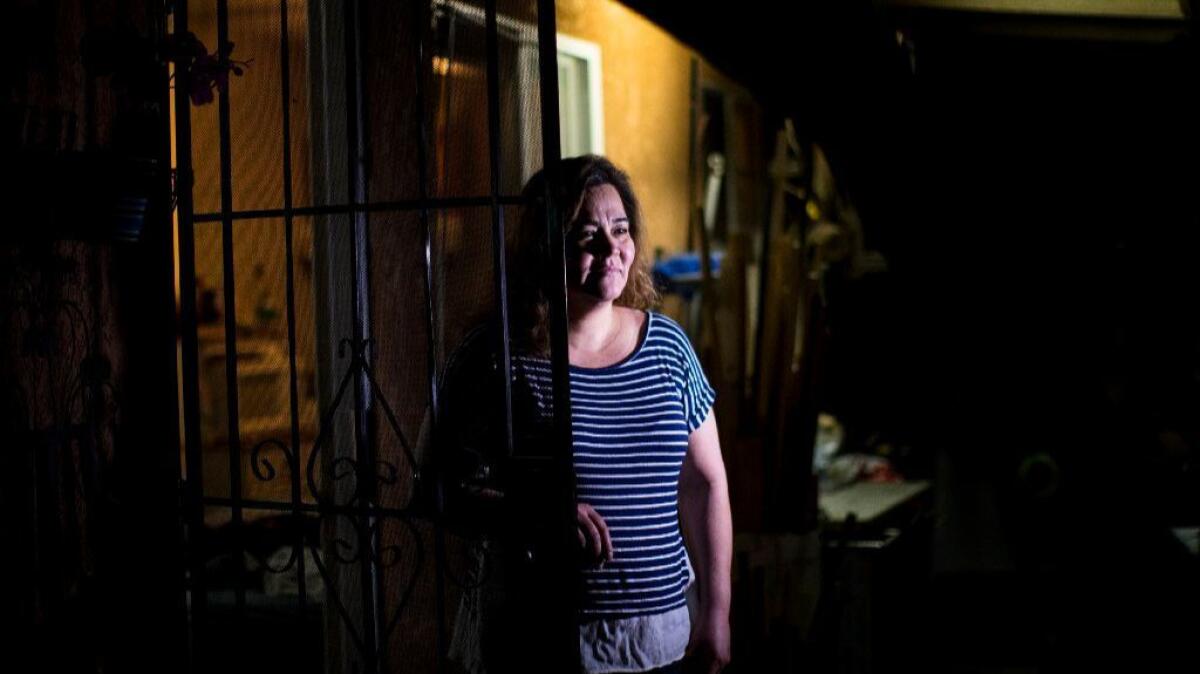Thousands of Salvadorans in Los Angeles worry about Trump ending temporary legal status

When Yesenia Reyes made it to the southern U.S. border in 2000 after fleeing domestic violence in El Salvador, she told immigration agents they would be sentencing her to her death if they sent her back.
The following year, Reyes became one of thousands of Salvadorans to receive temporary legal protection under a program designed to help citizens of countries experiencing armed conflict, environmental disaster or other conditions that prevent them from immediately returning safely.
Now, after 17 years in the U.S., the Bell resident and mother of six worries she’ll be forced to return to El Salvador. The Trump administration has until Monday to decide the fate of more than 260,000 Salvadorans who live in the United States under “temporary protected status.”
Salvadorans make up the biggest portion of TPS beneficiaries. And California is home to the most TPS holders from El Salvador — 49,100 people, according to a 2017 report from the Center for Migration Studies. Roughly 30,000 of those live in Los Angeles.
“We are in the limbo of not knowing what will happen,” Reyes said. “It’s very hard for us because we don’t know what to do, losing sleep, losing our appetite. I feel like I’ve gotten sick over this decision.”
For months, administration officials have signaled their intention to end special designations that have allowed immigrants who entered the U.S. illegally from El Salvador and nine other troubled nations to stay and work in the U.S. The protections were intended to provide temporary respites for citizens of hard-hit countries, not permanent legal status in the U.S., officials note.
The administration already eliminated TPS for 5,300 Nicaraguans, effective January 2019, and nearly 60,000 Haitians, effective July 2019. At the same time, officials put off making a decision on the fate of 86,000 Hondurans, saying they needed six months to gather information about conditions there.
Officials have repeatedly invited Congress to pass a law that would create a permanent solution for the recipients of temporary status. Congress members have introduced four bills aimed at preserving the program and providing a path to residency for those who currently hold protected status.
Many Salvadorans have lived in the U.S. for more than two decades, having arrived arrived as children and now having U.S. citizen children of their own, according to the Center for Migration Studies. The vast majority are employed and live above the poverty level. A third hold mortgages.
Advocates say that eliminating TPS for Salvadorans would leave employers in a lurch and break apart families with deep roots in the U.S.
Pablo Alvarado, executive director of the National Day Laborer Organizing Network, said Salvadorans would not voluntarily return to a dangerous, unstable country. But he wonders how long they would be able to remain in the U.S. without legal status, given that the federal government already knows their home addresses and workplaces.
“It’s a very intense situation,” he said. “These are well-established people. TPS is actually a program that has facilitated the integration of these immigrants.”
Reyes works 80 hours a week as a housekeeper at two hotels near Los Angeles International Airport. She worries whether she would lose her job if her TPS expires. She said human resources at the hotels check employees’ legal status every so often.
She wonders what kind of living she could make in El Salvador with a sixth-grade education, how she could pay for her daughter’s diabetes medication.
Perhaps scariest is the prospect of taking her children to a country ridden with gangs. Her mother told her recently that gang members had recently killed three youths and thrown their bodies into a stream near her home.
Reyes is on the waiting list for a U visa, which are given to victims of crime. Applications have skyrocketed in the last decade and Congress has set a cap of 10,000 visas per year. Meantime, all she can do is maintain hope.
“I’m trying to have patience,” she said.
Evelyn Hernandez has worked for years to maintain TPS as an organizer with the Central American Resource Center in Los Angeles. Hernandez came to the U.S. from El Salvador in 1992, toward the end of the country’s decade-long civil war.
She watched with horror when the Trump administration ended Deferred Action for Childhood Arrivals, the program that has shielded from deportation some 800,000 immigrants who came to the U.S. illegally as children.
“Our first concern was, if that’s going to happen to them, it’s going to happen to us,” she said.
As the only person in her family to leave El Salvador, Hernandez financially supports her elderly parents who have diabetes and osteoporosis. When Trump won the presidency, she said her father called her crying, wondering what would happen if she were deported.
But Hernandez has three sons in college, and the oldest, who is over age 21, could sponsor her for permanent residency.
“I have the opportunity for my kids to petition for me, but other people don’t,” she said. “I am fighting for them, too.”
More to Read
Sign up for Essential California
The most important California stories and recommendations in your inbox every morning.
You may occasionally receive promotional content from the Los Angeles Times.










